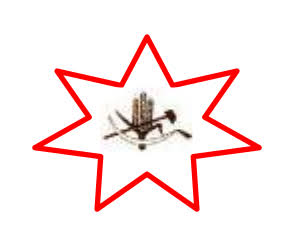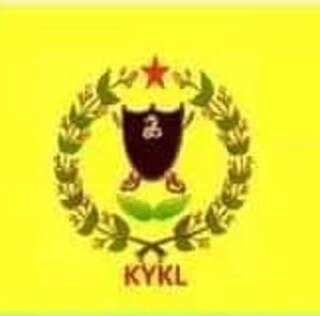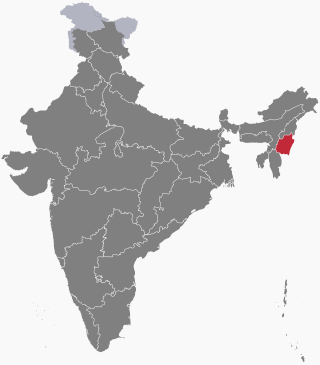
Manipur is a state in northeast India, with the city of Imphal as its capital. It is bounded by the Indian states of Nagaland to the north, Mizoram to the south and Assam to the west. It also borders two regions of Myanmar, Sagaing Region to the east and Chin State to the south. The state covers an area of 22,327 km2 (8,621 sq mi). The official and most widely spoken language is the Meitei language. Native to the Meitei people, it is also used as a lingua franca by smaller communities, who speak a variety of other Tibeto-Burman languages. Manipur has been at the crossroads of Asian economic and cultural exchange for more than 2,500 years. This exchange connects the Indian subcontinent and Central Asia to Southeast Asia, East Asia, Siberia, regions in the Arctic, Micronesia and Polynesia enabling migration of people, cultures and religions.

The Insurgency in Northeast India involves multiple separatist militant groups operating in some of India's northeastern states, which are connected to the rest of India by the Siliguri Corridor, a strip of land as narrow as 14.29 miles (23.00 km) wide.

Okram Ibobi Singh is an Indian Politician who is currenting serving as the member of the Manipur Legislative Assembly representing Thoubal Assembly constituency since 2007, from Khangabok Assembly constituency from 2002 to 2007 and from 1984 to 1995. He also served as the 11th Chief Minister of Manipur from 2002 to 2017 and the Leader of the Opposition, Manipur Legislative Assembly from 2017 to 2022 as a member of the Indian National Congress.

The People's Revolutionary Party of Kangleipak (PREPAK) is an armed insurgent group in Manipur demanding a separate and independent homeland. PREPAK was formed under the leadership of R. K. Tulachandra in 1977.
Moreh is a border town located on the India–Myanmar border in Tengnoupal district of the Indian state of Manipur. As a rapidly developing international trade point with the integrated customs and international immigration checkpoint, Moreh plays an important role in India's Look East Policy, trade and commerce under ASEAN–India Free Trade Area, India-Myanmar relationship, India–Myanmar–Thailand road connectivity, and Trans-Asian Railway connectivity.

The People's Liberation Army of Manipur, often shortened to the People's Liberation Army, is a militant group fighting for the creation of an independent and socialist Manipur, a state in northeastern India.
Christianity is the fastest growing and second most followed religion in Manipur, a state in Northeast India, according to 2011 census data of India.
Secession in India typically refers to state secession, which is the withdrawal of one or more states from the Republic of India. Whereas, some have wanted a separate state, union territory or an autonomous administrative division within India. Many separatist movements exist with thousands of members, however, some have low local support and high voter participation in democratic elections. However, at the same time, demanding separate statehood within under the administration of Indian union from an existing state can lead to criminal charges under secession law in India. India is described as an ‘Union of States’ in Article 1 of the Indian constitution I.e "Indestructible nation of destructible states" by its father of constitution Dr. Bhimrao Ramji Ambedkar where a state or Union territory of India cannot secede from India by any means and the Central Government has more powers than the respective state governments and can forcefully change the names and boundaries of the states without their permission at any time when needed for self interest and for the maintenance of integrity.

Human rights abuse is an ongoing insurgency in Manipur, a northeastern Indian state. The issue started in the 1960s due to a separatist conflict. The Indian army, paramilitary, and police personnel are responsible for killings and torture within Manipur. Human rights violations by Indian security forces are said to have fueled the armed opposition groups in Manipur. Insurgent groups have kidnapped children to train them as child soldiers against the Indian government. Manipur was declared a “disturbed area” by the Indian government in 1980 in the Armed Forces Special Powers Act of 1958.

Kanglei Yawol Kanna Lup is a Meitei insurgent group that operates in the state of Manipur in India. It was formed in January 1994 by a faction of the United National Liberation Front (UNLF) led by Namoijam Oken in conjunction with splinter groups of Kangleipak Communist Party (KCP) and People's Revolutionary Party of Kangleipak (PREPAK). It is a secessionist organisation and banned by the Government of India. The group displays a strong ethnonationalist and nativist rhetoric in their announcements.

Kangleipak Communist Party is a Maoist militant group in Manipur, India. Named after Kangleipak, the ancient name of Manipur, it was initially led by the communist ideologues — Ibohanbi and Ibopishak. The Kangleipak Communist Party (KCP) had been engaged in an armed conflict separatist insurgency in Manipur against the government of India.

The Maoist Communist Party of Manipur is a Maoist political party in Manipur which aims "to establish a communist society through armed revolutionary war." The Maoist Communist Party of Manipur also intends at liberating the people of Manipur from whom they view as "colonial India."

The Insurgency in Manipur is an ongoing armed conflict between India and a number of separatist rebel groups, taking place in the state of Manipur. The Insurgency in Manipur is part of the wider Insurgency in Northeast India; it displays elements of a national liberation war as well as an ethnic conflict.

Meira Paibi is a women's social movement in the Indian state of Manipur. Referred to as the "guardians of civil society", Meira Paibi dates to 1977 in present Kakching district. It derives its name from the flaming torches which the women carry while marching through city streets, often at night. They do so both as a patrol, and in protest, seeking redress against human rights violations committed by paramilitary and armed forces units against the innocent. Contextualized, Meira Paibi was founded at a time when the people of Manipur were fighting for self-determination, political autonomy, and independence.

The following outline is provided as an overview of and topical guide to Manipur:

The Kuki National Army (KNA) is a Kuki insurgent group active in Myanmar,but not functioning properly in Northeast India. It is the armed wing of the Kuki National Organisation.
The Kuki National Organization (KNO) is a political organization established in 1988, with the aim of representing the interests of the Kuki people in northeast India and northwest Myanmar (Burma). The organization operates alongside its principle armed wing, the Kuki National Army (KNA), and has been active in advocating for the rights and aspirations of the Kuki community.
Rajkumar Meghen alias Sana Yaima is a Manipuri separatist politician and former chairman of United National Liberation Front.
On 3 May 2023, ethnic violence erupted in India's north-eastern state of Manipur between the Meitei people, a majority that lives in the Imphal Valley, and the Kuki-Zo tribal community from the surrounding hills. According to government figures, as of 3 May 2024, 221 people have been killed in the violence and 60,000 people have been displaced. Earlier figures also mentioned over 1,000 injured, and 32 missing. 4,786 houses were burnt and 386 religious structures were vandalized, including temples and churches. Unofficial figures are higher.
The International Meeteis Forum is a Meitei ethnic advocacy group in the Indian state of Manipur. Its objectives are to assert Meitei indigeneity in Manipur, to unify Meiteis around the world, to campaign for the territorial integrity of the Manipur state and to block the influx of alleged foreigners. Founded in 2012 by a retired army officer R. K. Rajendro, it later teamed up with the Federation of Haomee with similar ideological motivations. Both the organisations generated free-flowing hate speech against the Kuki community of Manipur, labelling them as "immigrants" or "foreigners", which was instrumental in the generation of 2023 Manipur violence.











